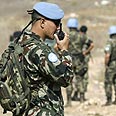

The uncovered Israeli spy devices in Lebanon and their detonation got little attention by Lebanese media on Monday. The al-Mustaqbal newspaper owned by Prime Minister-designate Saad Hariri didn't refer to the affair in its main page, while an-Nahar daily covered the incident as part of a political item regarding the Lebanese president's visit to Madrid and contacts between political parties for the establishment of a new government.
The Israeli army said the Lebanese allegations "do not warrant a serious response," while the United Nations Interim Force in Lebanon (UNIFIL) and Lebanon accused Israel of violating UN resolution 1701.
The only media body that provided a detailed report of the incident was Lebanese Hezbollah-affiliated daily as-Safir which chose to title its item: "Resistance uncovers Israeli spy devices."
The daily reported that as part of an "open intelligence war with the enemy," Lebanon succeeded through its army and Hezbollah to expose two espionage devices which were placed during the Second Lebanon War in the framework of an Israeli attempt to spy inside Lebanese territory. The newspaper reported that following the exposure the Israeli army decided to detonate the devices.

Examining the explosion site (Photo: AFP)
The daily further reported that the incident comes as another painful blow to Israeli espionage networks in Lebanon "which proves that the resistance is ready for any development with the enemy and shows coordination between the army and the resistance." as-Safir further noted, "This proves Lebanon is no longer safe ground for enemy agents' operation or its spy devices."
'Important decision'
As-Safir claimed that a Hezbollah squad was the one to expose the devices as early as Saturday and had informed the military in order for it to perform scans; however the Israeli army chose to quickly detonate the devices after it learned of their exposure. It was further reported that prior to the second device's explosion IDF informed the Lebanese army through UNIFIL not to come close to the site.
The newspaper also noted that the most important aspect of the event was the Lebanese army's decision to fire antiaircraft fire at the Israeli MRPVs (mini remote-piloted vehicle) which were flying above the border area after the devices were uncovered.
According to as-Safir the Lebanese army's command informed UNIFIL Commander General Claudio Graziano that it decided to open fire at any Israeli aircraft which will violate the Lebanese sovereignty.
The newspaper also reported that the devices were connected through cables to a broadcast post equipped with cameras in the Upper Galilee "settlement" of Menara.















